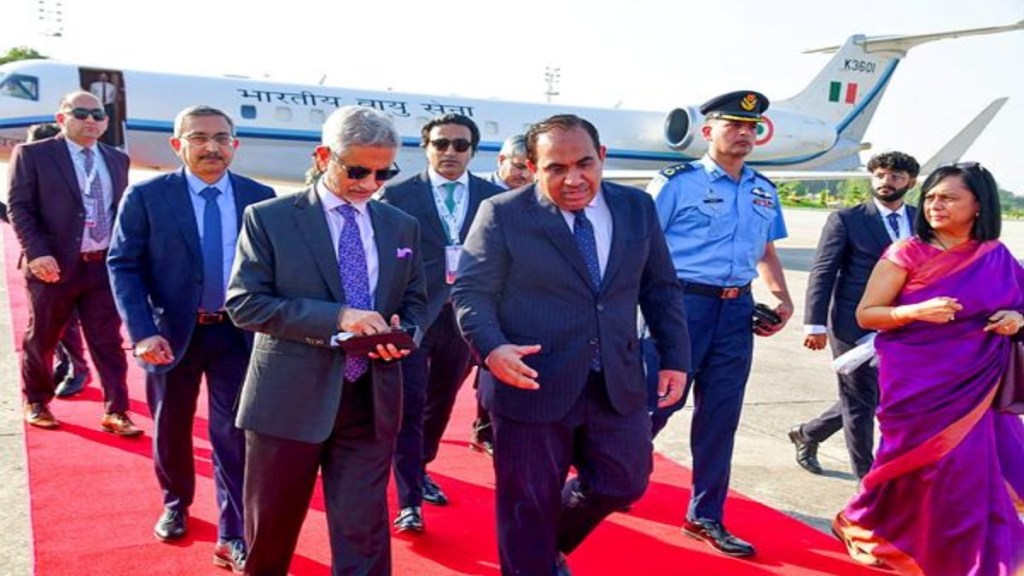By Abhishek Jha
About a dozen Indian journalists crossed over to Pakistan on foot via Atari-Wagah border on Monday afternoon ahead of the much-anticipated Shanghai Cooperation Organization (SCO) summit hosted by Pakistan. This was no ordinary visit as it was only the second time in about a decade that a handful of Indian journalists were allowed to visit Pakistan to cover major news event. The last one being in 2015 when erstwhile foreign minister Sushma Swaraj had visited Islamabad to attend the Hearts of Asia summit. Subsequently, Rajnath Singh had visited Pakistan in December 2016, which was primarily for the Heart of Asia-Istanbul Process conference.
On Tuesday, External Affairs Minister S Jaishankar landed in Nur Khan airbase of Islamabad around 4 PM local time to represent the Indian government at the high table of the SCO summit. The visit is important for more than one reason. Given the political unrest in Pakistan and India’s steadfast stance on terrorism, the workings of the summit will be keenly followed by those in India and Pakistan.
Owing to the complexities of the bilateral ties between India and Pakistan, the SCO, a significant regional bloc comprising several major players, has long been overshadowed by the fraught relationship between the two nations.
In the lead-up to Jaishankar’s visit, the Indian government has reiterated its uncompromising stance on cross-border terrorism. Jaishankar has been vocal about Pakistan being the “epicentre of terrorism”, and his previous statements, such as the refusal to accept “terrorism by night and trade by day”, reflect a zero-tolerance policy that has shaped India’s diplomatic posture in recent years. This backdrop casts a long shadow over any potential bilateral dialogue, leaving little room for optimism.
This is the first time in decades that Pakistan is holding a major multilateral meeting where head of states, prime ministers and senior ministers are gathering to discuss the regional issue. For a country which has been in the quagmire of internal unrest and financial crisis for years now, the SCO provides an apt opportunity to showcase its strength and resilience. The Shabebaz Sharif-led coalition government does not want to leave any stone unturned to make it look like a major successful event that may lift its stature, if not globally, then at least in the region and its immediate neighbourhood.
The Pakistani political landscape is equally charged. Amid the ongoing unrest in major cities called by PTI workers in support of their leader Imran Khan and others languishing in jails, a few Pakistani politicians, including ministers in the current government, have tried to deflect blame towards India, claiming that New Delhi aims to sabotage the SCO’s objectives. Such rhetoric to shore up support among the domestic audience undermines the optimism, if any left, for potential bilateral engagements between the visiting Minister of External Affairs of India and his Pakistani counterpart.
The regional bloc of SCO has expanded in recent years and now boasts India, Iran, Kazakhstan, China, Kyrgyzstan, Russia, Pakistan, Tajikistan and Uzbekistan as full members. Three countries — Afghanistan, Belarus, and Mongolia — have an observer status with the SCO, and fourteen countries — Azerbaijan, Armenia, Bahrain, Cambodia, Egypt, Kuwait, Maldives, Myanmar, Nepal, Qatar, Saudi Arabia, Sri Lanka, Türkiye and UAE — have a dialogue partner status. The bloc’s members host about 40% of the global population, and 32% of the world’s GDP. However, the persistent animosity between its two most influential members continues to undermine its efficacy.
Jaishankar’s visit comes at a critical juncture. While he is expected to engage with other SCO members on pressing regional issues, the lack of an agenda for bilateral discussions with Pakistan is glaring. Both sides have been unequivocal in their denial of any planned engagement, with Jaishankar himself stating, “I will go for the SCO”. This statement, devoid of optimism for dialogue with Pakistan, reinforces the perception that the visit will be more about managing differences than fostering cooperation.
The stagnation of SAARC is emblematic of the broader challenges that regional groupings face when their key members are at odds. The question looms: can the SCO break this cycle, or will it too fall victim to the historical animosity that defines the subcontinent’s geopolitical landscape?
Despite Jaishankar’s high-profile visit, there’s an undercurrent of doubt, as expectations for progress in India-Pakistan relations remain low. Yet, diplomacy is a long game, where outcomes often defy the odds. Journalists stationed on either side of the Attari-Wagah border hold on, anticipating a potential story that could finally reward their watchful wait.
The author is an independent journalist covering foreign and strategic affairs for more than fifteen years. He is attending the ongoing SCO Summit in Islamabad.
Disclaimer: Views expressed are personal and do not reflect the official position or policy of FinancialExpress.com Reproducing this content without permission is prohibited.

